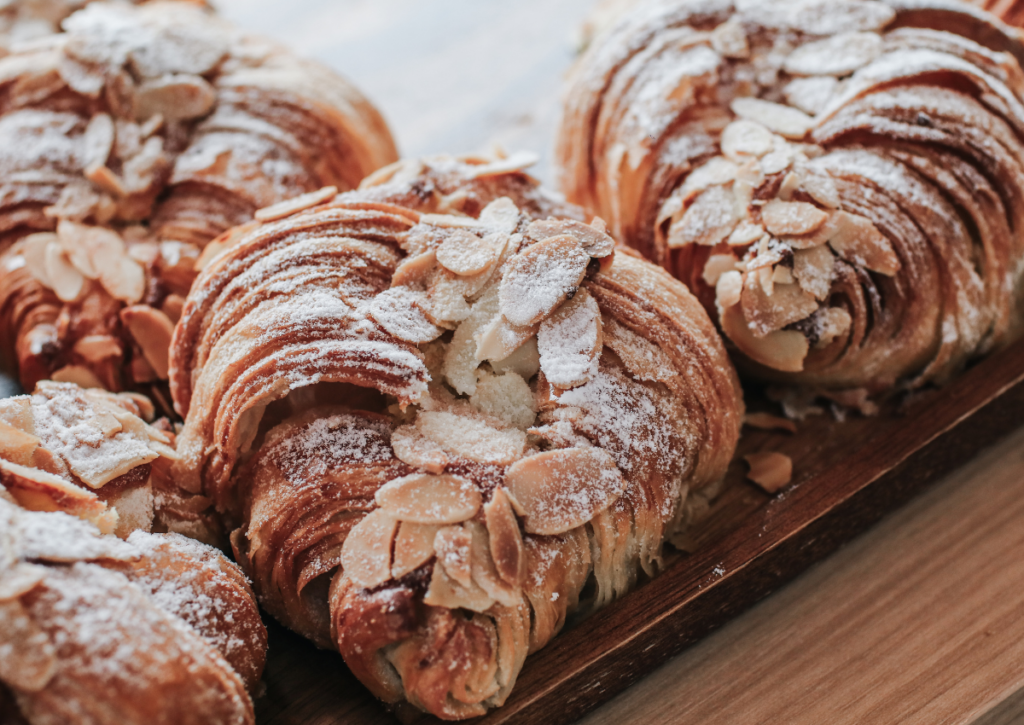Flaky pastries are France’s gift to global breakfasts. The breakout star of the buttery ensemble known as viennoiserie is undoubtedly the croissant, an icon of French gastronomy. They’re irresistible when visiting France, so here’s how to pronounce croissant in French like you’re a local.
croissant
/kʀwasɑ̃/

Croissant Pronunciation in French
The ultimate croissant is an alchemic marriage of butter and golden pastry baked to delicate yet chewy perfection.
Freshly made in every village and town boulangerie (bakery), it’s far-and-away France’s favorite breakfast treat.
Gourmands can thank Austrian soldier turned baker August Zang, who introduced the prototype in La Boulangerie Viennoise, a Parisian bakery he opened with partner Ernest Schwarzer in 1837.
The house specialty was breakfast breads, notably an Austrian bread called kipferl shaped like a crescent (croissant in French!). His morning baked goods were an instant hit, earning the collective name viennoiserie, starting a food trend that snowballed into a national culinary passion.
Fast-forward to the 20th century, yeast was added to the butter-rich crescent, and the modern croissant was born, in all its flaky deliciousness.
The croissant is such a global food that you might not have noticed how it is pronounced across the Atlantic.
To say croissant in French, first drop the “t,” which is silent. “Croiss” is trickier but sounds like kwa. Push them together for kwa-son and an unmistakably French sound, as you can hear in this video clarifying how to say croissant.
Croissant au Beurre
Croissant au beurre translates to croissant with butter. It’s a necessary distinction from factory-made croissants produced with margarine.
The distinction is unnecessary in a boulangerie, where the mere suggestion of using margarine will raise an eyebrow. And possibly a rolling pin.
In less discerning venues, you can check for butter enrichment by looking for the suffix au beurre. It sounds similar to O-Burr, as our French recording below demonstrates.
croissant au beurre
butter croissant
Although you rarely need to ask. Aside from looking flat and pale, there is a big clue. Only margarine versions are shaped like a croissant in France, while a croissant au beurre is always straight.
Croissant Ordinaire
Languishing in service stations and supermarket shelves is the unloved counterpart to a croissant au beurre, the croissant ordinaire (ordinary croissant). It’s anything but regular in France, where butter rules supreme (even if margarine is a French invention), but worth knowing how to pronounce.
To pronounce ordinaire with a French twang, you only need to change the ending from the English version. Ignore the silent “e” to be left with air. Sounds just like or-deen-air.
croissant ordinaire
ordinary croissant
Croissant aux Amandes
How do you make a croissant extraordinary? Stuff it with frangipane (almond paste) and make it into a sugary croissant aux amandes or croissant with almonds.
It’s almost impossible to eat two of these toothsome yet dense delights. To test the limits of your sweet tooth, here’s how to pronounce croissant aux amandes.
croissant aux amandes
almond croissant
The quick route to sounding more French is identifying the silent letters. In this case, aux sounds precisely like au. And the “es” is not required when pronouncing amandes.
You’ll also need to put a French spin on amandes, which sounds more like a-mon-d. The next step is deciding whether you want un ou deux croissants aux amandes, s’il vous plait (one or two almond croissants, please).

Pain au Chocolat
A croissant is undoubtedly the headline act of the viennoiserie array in a French boulangerie. On the undercard are treats like pain au raisin (raisin bread), torsades au chocolat (chocolate twists), and chaussons aux pommes (literally slippers with apples, aka puffed pastry apple pies).
Arguably, the ultimate breakfast support act is a pain au chocolat, or chocolatine in some corners of France.
Translation: chocolate bread.
The pillow of doughy goodness threaded with chocolate is another invention of the original croissant guys, August Zang and Ernest Schwarzer.
English phonetics can’t do justice to the French pronunciation of pain au chocolat.
pain au chocolat
chocolate bread
You might already know that pain sounds like a sharp version of the English word pan.
To master chocolate, start with a soft “sh” and don’t sound the silent “t”, similar to shock-o-la.
Pain (bread) is the cornerstone of French food. Buerre (butter) and chocolat (chocolate) are in the mix too. Safe to say that those Austrian bakers knew their customers.

Petit Pain au Chocolat
Mini-viennoiserie is the call when you want to eat them all. Une petite bouchée (a little bite) of each treat settles all debate.
If you’ve already loaded up with croissants but can’t say no to a little extra indulgence, here’s how to pronounce petit pain au chocolat.
petit pain au chocolat
little chocolate bread
As pain is masculine, the “t” at the end of petit is silent, sounding like peh-tee.
Need an even more vivid guide. Then we’ll sign off with French chanteur Joe Dassin and his ode to a boulangerie romance, “Le petit pain au chocolat.”
Spend a few days in France, and you won’t have to worry about how to say croissant. You’ll probably have all the practice after endless temptation in a land filled with bakeries.
If you want to practice a few more French words, our guide to pronouncing French wine names offers a few more linguistic tips to enrich your gastronomic and language learning adventures.

